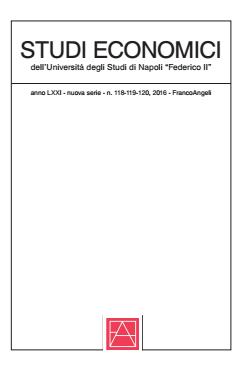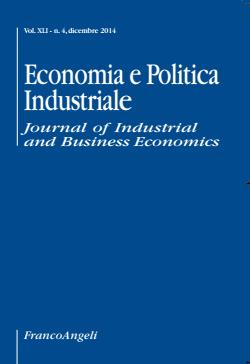
LIBRI DI BRUNO JOSSA
La ricerca ha estratto dal catalogo 22 titoli


In the light of the variety of different effects that technical progress may generate, it is fairly difficult to flesh out a satisfactorily comprehensive theory of it. The author’s approach in this paper is to identify specific categories of technical progress and conduct a detailed analysis of their respective effects.

The paper deals with and intends to demonstrate three central ideas: Marx’s analysis is based on the concept of "totality" and is radically different from the orthodox analyses, Marx’s analysis is scientific, because it accepts the non-contraddiction principle, the two ideas of capitalism are not incompatible between them and may be confronted to comprehend which is the correct vision of capitalism. Keywords: marxismo, socialismo, dialettica, metodologia, materialismo storico JEL Classification: P, B14, B5 002 Abstract That an overwhelming majority of Taranto citizens did not seize the opportunity provided by the two referenda - poorly set up as they were - to let their opinions known on issues of deep concern for them, as the operation of the steel plant, Ilva, was unexpected, and may cast doubt on their civic awareness. Retrospectively, we may provide an explanation: the fear of losing their industrial jobs may be stronger than the fear for their health and life. To the extent that the mere participation to the referenda was regarded as a threat to the status quo, they chose to abstain. This, as we have seen, is compatible with the hypotheses that their behavior was governed by a mental map in which there was some room for strategic considerations. They may have solved their huge coordination problem by thinking they were each engaged in a small coordination game.


The aim of this article is to discuss some of the main advantages of an employeemanaged system: a labour productivity edge on capitalistic businesses, the suppression of external firm control, slower monopoly-building and softer competition, the eclipse of the paramount role of economics in social evolution and a reduced need for state intervention into the economy. The author’s analysis sheds light on whether, and in what sense, economic democracy is a public good proper or just a "merit good". From the classification of cooperative as merit goods it follows that any government, regardless of political-economic orientation, should make it its task to support the growth of the democratic firm system by enforcing tax or credit benefits in its favour.

This paper investigates the funding difficulties of producer cooperatives and the potential risks for their financers. It claims that a cooperative requiring members to underwrite bonds will not automatically cease being an LMF (labour-managed firms), nor run the risk of under-investing. The paper also claims that an LMF-type firm will not necessarily tend to make high-risk investments because the link that binds LMF members to their firm is closer than that between shareholders and capitalist firms. Further claims are advanced and discussed to confute the widespread assumption that LMFs have no way out of their funding difficulties.

Alienazione e autogestione - Marx’s alienation theory and the firm managed by workers, by Bruno Jossa The paper is about Marx’s theory of alienation and the economics of producer cooperatives. The author argues that alienation has different degrees and that the highest form of it is recorded in capitalism, owing to hired labour. For this reason a labour-managed firm will reduce the alienation. In a system of labour-managed firms, however, alienation will persist, in conseguence of scarsity and the necessity of work for a living. In the paper there is also a discussion of a thesis of Bigo. The last section is about Marx’s idea that capitalism is a world turned upside down. JEL Classification: B14, B5, P13, P14, P2.

Producer Co-operatives as a New Production Mode (by Bruno Jossa) - This paper collects some simple ideas. A system of producers cooperatives it argues is a new production mode in the sense of Marx. The LMF type of cooperatives reverses the existing capital/labour ratio and may realize a revolution also if the foundation of new cooperatives proceeds step by step in a capitalistic economy. A centralized economy without labour managed enterprises does not realizes socialism. The fundamental contradiction of capitalism is not the contradiction between plan and market, but the contradiction between capital and labour. Control of economic activity, the socialist view, must be realized through labour managed enterprises, not through state controlled enterprises. JEL Classification: P13, P2, B5, P50





cod. 365.180

cod. 363.30



Seminari sui fondamenti dell'economia politica
cod. 363.17


